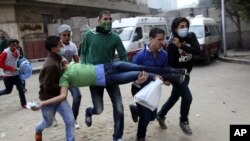CAIRO, EGYPT —
Thousands of protesters in Cairo's Tahrir Square are rallying against Egyptian President Mohamed Morsi, hours after the president told the nation's top judges that elements of his new decree granting himself more powers and authority must stand.
Morsi's promise to enforce the constitutional declaration only in certain cases has done little to lessen the anger of those who see him as a dictator in the making.
Protesters chanted for his downfall Tuesday and that of the Muslim Brotherhood's Supreme Guide. Many here feel it is the Brotherhood that pushed Morsi to expand his powers, despite his formal break with the organization that helped him win the presidency.
Opponents said that words aside, the president has not changed the decrees themselves, which put his decisions above judicial review on a temporary basis.
Soundslides: On the scene in Cairo
Amr Said, a protester on the square, said that the declaration is even more authoritarian than the dreaded emergency laws of the previous government.
Said said the emergency laws governed the security forces, while the constitutional declaration affects the judicial and legislative branches, as well. He added, "We didn't have a revolution to oust one dictator, only to bring in another."
Protesters came from across the country to take part in the demonstration in Tahrir Square, the heart of the uprising that toppled the old government.
Ahmed Abdelazziz, a medic from Alexandria, said Morsi must listen to the will of the people.
With the judiciary's role uncertain, legal challenges to the decree will be heard in early December. It is unclear, though, if Morsi will abide by any court ruling, and protesters argue their demonstrations are the only check on his power.
Concerns grow
Tensions grew in the square as more people arrived throughout the day with skirmishes between police and protesters along side streets.
Across the capital, however, fears abated after the Brotherhood and other Islamist groups called off a planned counter-demonstration that had many fearing further clashes.
That decision, and Morsi's promises to the judiciary on Monday, have left some people convinced he is only trying to move the country forward, as he promises, by ushering in a new constitution and parliament, free from interference from further judicial challenges.
On the outskirts of the square, accountant Yahya Abdelmutaleb had a benign view of the president's actions.
"Actually he makes this law only for two months, until we have a new parliament - only limited time," he said. "But some people couldn't understand. They thought he will make it forever, or for four years."
VOA's Mark Snowiss contributed to this report from Washington.
Morsi's promise to enforce the constitutional declaration only in certain cases has done little to lessen the anger of those who see him as a dictator in the making.
Protesters chanted for his downfall Tuesday and that of the Muslim Brotherhood's Supreme Guide. Many here feel it is the Brotherhood that pushed Morsi to expand his powers, despite his formal break with the organization that helped him win the presidency.
Opponents said that words aside, the president has not changed the decrees themselves, which put his decisions above judicial review on a temporary basis.
Soundslides: On the scene in Cairo
Amr Said, a protester on the square, said that the declaration is even more authoritarian than the dreaded emergency laws of the previous government.
Said said the emergency laws governed the security forces, while the constitutional declaration affects the judicial and legislative branches, as well. He added, "We didn't have a revolution to oust one dictator, only to bring in another."
Protesters came from across the country to take part in the demonstration in Tahrir Square, the heart of the uprising that toppled the old government.
Ahmed Abdelazziz, a medic from Alexandria, said Morsi must listen to the will of the people.
With the judiciary's role uncertain, legal challenges to the decree will be heard in early December. It is unclear, though, if Morsi will abide by any court ruling, and protesters argue their demonstrations are the only check on his power.
Concerns grow
Tensions grew in the square as more people arrived throughout the day with skirmishes between police and protesters along side streets.
Across the capital, however, fears abated after the Brotherhood and other Islamist groups called off a planned counter-demonstration that had many fearing further clashes.
That decision, and Morsi's promises to the judiciary on Monday, have left some people convinced he is only trying to move the country forward, as he promises, by ushering in a new constitution and parliament, free from interference from further judicial challenges.
On the outskirts of the square, accountant Yahya Abdelmutaleb had a benign view of the president's actions.
"Actually he makes this law only for two months, until we have a new parliament - only limited time," he said. "But some people couldn't understand. They thought he will make it forever, or for four years."
VOA's Mark Snowiss contributed to this report from Washington.









